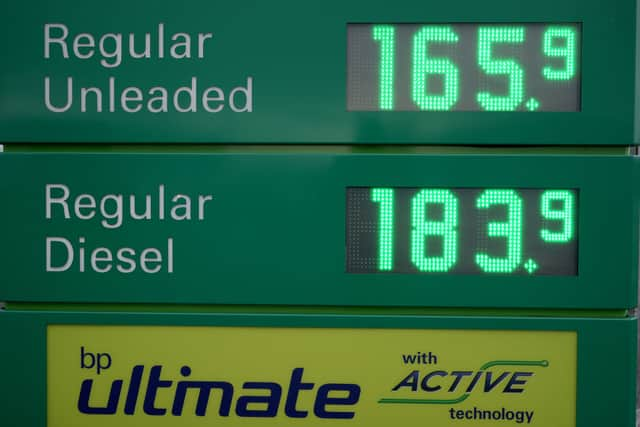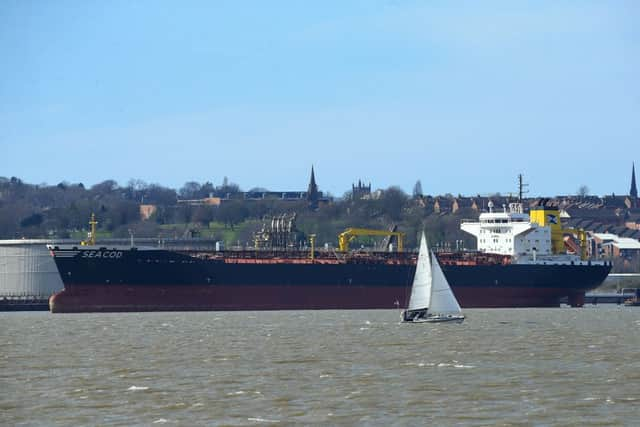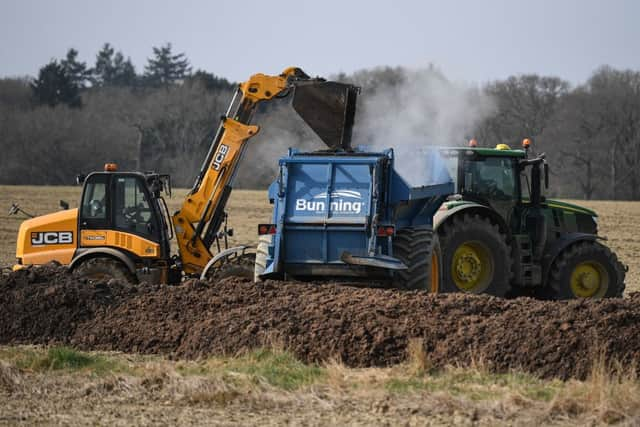Is there a diesel shortage? Why are there queues at UK petrol stations, red diesel ban explained - and prices
and live on Freeview channel 276
Drivers in parts of England have been reporting diesel shortages as fuel stations.
The areas most affected by diesel shortages are in the southeast of England, but motorists have reported not being able to find diesel at fuel stations in regions such as Birmingham, the Black Country, Worcestershire, and Staffordshire.
Advertisement
Hide AdAdvertisement
Hide AdIt brings back memories of 2021 where there were queues of cars snaking from the forecourt in a rush to top up on fuel in the midst of rising prices and an apparent shortage.
Now, drivers are reporting similar scenes at pumps across the country, but this time it’s diesel that appears to be the hot commodity.
Petrol stations without diesel have begun to put up signs, warning motorists about the lack of supplies in an attempt to prevent long queues from building up.
But why is there a shortage, and how could it affect things like food supplies?
Here is everything you need to know about it.
Why is there a diesel shortage?
Advertisement
Hide AdAdvertisement
Hide AdDrivers were hit by the largest monthly spike in pump prices on record in March, despite a cut in fuel duty, according to new analysis.
The RAC said the average cost of a litre of diesel at UK forecourts rose by 22.1p to end March at 177.3p, the largest monthly spike in pump prices on record.
The increases came despite Chancellor Rishi Sunak implementing a 5p per litre cut in fuel duty on 23 March.
The RAC said the rise in pump prices was driven by surging wholesale costs caused by the war in Ukraine and drivers would have been hit by even higher prices without the cut in fuel duty.


Advertisement
Hide AdAdvertisement
Hide AdBut while rising prices are somewhat to blame for the perceived shortage in the fuel, as drivers look to fill up before costs rise any further, they are only part of the problem.
Activists from Just Stop Oil and Extinction Rebellion groups obstructed 10 fuel sites in the Midlands and southern England in the early hours of Friday 1 April, to stand against “expanding UK oil and gas production”.
Protesters were glued on to roads, suspended on bamboo tripods, and locked on to oil drums and each other from around 4am.
ExxonMobil UK, one of the country’s largest privately owned underground oil pipeline distribution networks, said it shut down three of its terminals as a result.
Advertisement
Hide AdAdvertisement
Hide AdThis has had a knock on effect on the availability of diesel at the pumps, as fuel deliveries were delayed.
How is Ukraine affecting supplies?
As we have seen in just about every other aspect of everyday life, the situation in Ukraine is also having an effect on supplies.
As a result of sanctions imposed against Russia for its unlawful invasion of its neighbour, Russian-owned or flagged vessels are banned from UK ports.
That’s all well and good, but though the UK government has pledged to stop importing Russian diesel by the end of the year, until then, the deliveries continue.
Advertisement
Hide AdAdvertisement
Hide AdRussia supplies nearly a fifth of the UK’s diesel fuel, but with Russian vessels unable to dock, that’s made fuel deliveries a logistical nightmare.


Is there a global diesel shortage?
But while all of the above have had an impact on the accessibility of diesel, global demand for the fuel was spiking even before the crisis in Ukraine.
Post-lockdown soars in demand meant that many suppliers were unable to keep up with sudden increases in the use of diesel.
“Stocks of lots of fuels are relatively low, but diesel in particular, in Europe, in the US and in Asia as well,” Neil Crosby, senior oil analyst at OilX, told the BBC.
Advertisement
Hide AdAdvertisement
Hide Ad“The demand for diesel has been very strong up until the crisis, and that also contributed to that. There’s just an imbalance between supply and demand.”
How can I check if my petrol station has diesel?
A way to check if a petrol station has a good supply is to check Google Maps. Look for petrol stations near you and then click on them. This will show you how busy they are.
If a station has a large bar for the current time that means it is busy or busier than average and there is likely fuel in stock. If there is a small bar that means it is less busy than usual and could be out of fuel.
A handy tool for checking prices is confused.com’s online checker.
Advertisement
Hide AdAdvertisement
Hide AdSelect the type of fuel you need and enter your postcode and it will show the cheapest stations in your area.
What is red diesel?
Another factor playing into the rising demand for forecourt diesel is the newly introduced ban on ‘red diesel’.
Red diesel is the term used for diesel that is intended for use other than as fuel in road vehicles - think agricultural or construction vehicles such as tractors, excavators, cranes and some other non-road applications such as boats.
It is taxed at a different rate than diesel used in road vehicles; diesel intended for use with road vehicles has a duty rate 57.95 pence per litre (ppl), while red diesel has an effective rate of just 11.14ppl.
Advertisement
Hide AdAdvertisement
Hide AdWhile diesel cars can run safely on the fuel, it is against the law to use it in any road-going vehicle.
It is essentially the same as the “white” diesel used in cars and other road vehicles, but is so called because it has been a requirement since 1961 for it to be marked with a red dye to prevent its misuse.


From 1 April 2022, red diesel became illegal for most vehicles. The change mostly affects businesses, rather than individual drivers, and is intended to promote the use of more sustainable fuels as part of the UK’s 2050 climate change targets.
But that means that those who previously relied on red diesel are now turning to the regular fuel to continue operating vehicles and machinery, meaning more demand at the pumps.
Advertisement
Hide AdAdvertisement
Hide AdAnd those that are still able to use the fuel for commercial purposes are also being hit with sharp price hikes.
For instance, one fisherman told the Daily Mail it was cheaper for him to get his boat “craned out of the water, cut the mast down, put it on a lorry and bring it to the petrol station and fill it up with white diesel.”
How could it affect food costs?
Rising diesel costs, a wider-spread ban on red diesel and delivery delays could have a wider impact in other areas of life too.
Since diesel is widely used in industry - such as in agriculture - rising costs and harder to source fuel could mean farmers are less able to provide vital food supplies.
Advertisement
Hide AdAdvertisement
Hide AdFishermen in Shetland, for instance, fear rising fuel prices could force them to tie up their boats.
The Shetland Fishermen’s Association (SFA) issued a plea to the Government as it said the war in Ukraine had seen the cost of marine diesel in the islands more than double in comparison to last year.
SFA chair James Anderson said rising fuel costs meant some crews were considering not going to sea, while others were taking wage cuts or releasing crew members.
In other European countries, government help is at hand.
Comment Guidelines
National World encourages reader discussion on our stories. User feedback, insights and back-and-forth exchanges add a rich layer of context to reporting. Please review our Community Guidelines before commenting.
